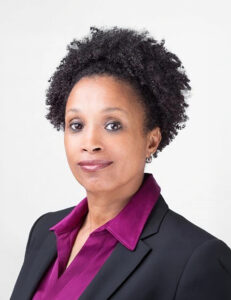When I was asked to contribute to these stories, at first, I wanted to focus on my hair story from a corporate and workplace perspective. However, as I reflected, my hair story actually started as a child growing up in Jamaica. Truthfully though, although my natural hair was very long and thick at that time, my challenge was actually the long hours spent for my hair to be “controlled.” These hours were either in our kitchen with my hair being “hot ironed” and then at a hairdresser to finish the process. I tell you it was a process – with my Dad wondering through commenting on the smell of burnt hair and Mom giving him the look and telling him why this was required to have well kept hair at school. You see at my high school we all wore uniforms and in addition we had rules as to personal hygiene and etiquette that did not have room for big curly hair. Back then we followed the rules and the status quo – knowing that if you did not you would be sent home in disgrace after your parents were called into school and lectured about breaking the rules. As I look back, I realize these rules were in fact colonial ideologies guised as “improper grooming” – rules that still exist in Jamaica today.
As I continued on my hair journey in Jamaica, I had joined a swim club with our swim training early in the morning before school. My hair took so long to dry that I would invariably wring out the excess water from hair, then towel dry my hair as much as possible and finally plait my very wet hair and jump on the bus for school. This led to knotted hair, asthma flare ups and arguments with my Mom who did not understand why I did not seem to like my hair. Finally, I convinced my Mom to take me to the barber and my long hair was cut off to a very short-cropped afro – I say afro facetiously as the constant damage to my hair left my hair with very little curl. When I got home my Father was appalled “Where is all your hair?” In fact, I got that reaction from family members, school colleagues and friends – “Why did you cut off your beautiful hair?” “So many do not have your “good hair” and you just cut it off.” For me personally as I saw all my hair falling to the ground – all I could think about was freedom – no more hair torture to fit in. However, I quickly learned about the impact of “good hair” and the Caste system embedded in the Black Caribbean culture since the days of enslavement. The focus on hair was a sign of beauty and defining different levels in society within our culture – the more kinky or curly the hair the lower you are in society and equitable access to opportunities. Just as I began to understand these implications we moved to Canada.
In Canada, I grew my hair back and as my hair grew my Father commented that he did not know my hair was so curly. Truthfully, neither did I as my hair was always straightened. The “good hair” syndrome also followed me to Canada with references from individuals who looked like me telling me the only reason I got good jobs is because I have “good hair,” and I am “light skinned.” Other comments were “how come your hair looks like that?” As I moved through the corporate world and into higher level jobs I became more comfortable stepping into my own style and my own hair. Finally – the last time I had my hair blow dried and flat ironed for a trim I had a senior executive walk into my office to take a picture for sharing and announced my hair looks much better this way. That was almost 8 years ago, and I have not straightened my hair since.
I also started to appreciate my natural hair – understanding the trauma I was carrying from the processes used to control my hair. Now my hair introduces me as I step through the door and when someone tries to touch my hair or make comments about why my hair looks like that – I use the moment as a teaching moment to share the personal importance of our hair throughout history and into the future.
This is my hair. This is my hair story.

